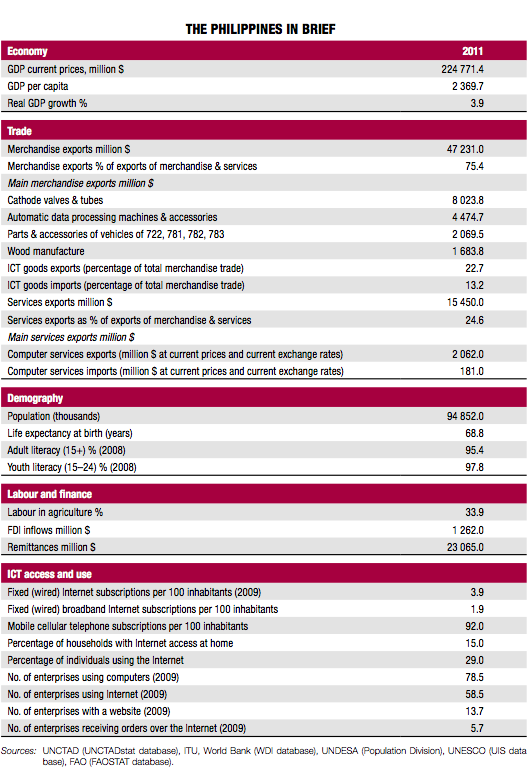Review of e-commerce legislation harmonization in the Association of Southeast Asian Nations (ASEAN) [UNCTAD/DTL/STICT/2013/1]
THE PHILIPPINES
- In Brief
- Summary
- Electronic transactions law
- Consumer protection
- Privacy and data protection
- Online content regulation
- Cybercrime and cybersecurity
- Online dispute resolution and domain-name regulation
![[ Galexia Dots ]](/images/hr.gif)
In Brief

Summary
The Philippines was an early adopter of e-commerce legislation, having passed the Electronic Commerce Act in 2000. The law has been complemented by administrative orders in areas such as electronic evidence, e-consumer protection, digital signatures, e-banking and e-payment in government. In 2012, the Philippines passed the Data Privacy Act and the Cybercrime Prevention Act, of which the latter is currently the subject of a constitutional challenge to the Supreme Court.
E-commerce and mobile commerce has a significant potential in the Philippines with its high level of mobile penetration, rapid uptake of mobile banking services and strong encouragement of business process outsourcing as a growth sector. However, the country’s low level of fixed broadband connectivity remains a bottleneck for more widespread uptake of e-commerce.
Electronic transactions law
The Electronic Commerce Act 2000 is based on the UNCITRAL Model Law on Electronic Commerce (1996). It provides that no electronic document or message shall be denied legal effect because it is in electronic form and it does not discriminate between different types of technology. The Act extends to electronic data messages and documents created for both commercial and non-commercial purposes.
The Implementing Rules and Regulations of the Electronic Commerce Act 2000 provide extra clarification and further information on a number of key aspects of the Act.
The Act also sets out legal rules for the admissibility of electronic documents or messages into evidence, the onus of proof of providing an electronic document has not been tampered with, and other procedural matters relating to using electronic data as evidence.
The Supreme Court of the Philippines promulgated the Rules of Electronic Evidence in 2001, paving the way for the speedy trial of the violators of this Act.
The Philippines has signed, but not yet ratified, the United Nations Convention on the Use of Electronic Communications in International Contracts (2005).
Consumer protection
The Philippines does not have dedicated consumer protection legislation for e-commerce. However a section in the Electronic Commerce Act 2000 provides some recognition of the need for consumer protection in the electronic environment.
Section 33(c) of the Act notes that violations of the Consumer Act 1991 and other “relevant or pertinent laws” committed using electronic data messages or electronic documents are to be penalized according to the same penalties available under those laws. The Consumer Act is the Philippines’s main consumer law focusing on protection against deceptive, unfair and unconscionable sales practices as well as ensuring consumers have adequate access to redress.
Technically, the provision does not add tailored or further consumer protections for e-commerce, but reaffirms the applicability of consumer legislation to electronic transactions, which has already been facilitated by the functional equivalence provisions in the Act.
In 2008, the Government issued Joint Department Administrative Order 01 which prescribes the “Rules and regulations for consumer protection in a transaction covered by the Consumer Act of the Philippines (R.A. 7394) through electronic means under the E-Commerce Act (R.A. 8792)”. The regulations aim at protecting consumers doing online transactions, specifically on the purchase of products and services. It covers both local and foreign-based retailers and sellers engaged in e-commerce.
Privacy and data protection
The Philippines has a comprehensive privacy law in place – the Data Privacy Act (2012). This is one of the most modern privacy laws in the region, incorporating a mix of guidance from the European Union, APEC and OECD. One interesting feature of the law is the large number of criminal offences that it creates – most privacy legislation is based on administrative or civil infringements and mediation/conciliation rather than criminal offences.
Online content regulation
Some basic provisions regulating online content are included in the cyber-crime legislation. These include provisions restricting access to materials promoting prostitution and child pornography with the aid of a computer or computer networks.
However, at the time of preparing this Review, this legislation has not yet entered in force.
Cybercrime and cybersecurity
Comprehensive and detailed provisions are contained in the Republic Act No. 10175, the Cybercrime Prevention Act 2012. This Act is the subject of a constitutional challenge to the Supreme Court, so it was at the time of drafting this Review not yet in force.
Cybercrime is also partly dealt with in a provision of the Electronic Commerce Act, stating that hacking, cracking, or unauthorized access using a computer in order to corrupt, alter, steal or destroy electronic data are all offences.
Online dispute resolution and domain-name regulation
A circular issued by the Philippine Intellectual Property Office (IPO) provides that domain names are registrable with the IPO in the same manner that service marks can be registered. The standard used to register domain names is the same standard used to determine the registrability of marks under section 123 of the Intellectual Property Code. This includes that the domain name cannot resemble another registered domain name in a manner that is confusing or likely to deceive, and the domain name cannot be identical or confusingly similar to a well-known (internationally or locally) domain name.
DotPH is the official domain registry of the Philippines ccTLD. A number of conditions contained in DotPH’s policies and standard form agreements are imposed by DotPH on those wishing to use a .ph domain. An institutionalized system for alternative dispute resolution has been created in the Philippines by the Alternative Dispute Resolution Act 2004. The Act also creates an Office of Alternative Dispute Resolution whose objective is to promote and expand the use of this method of settling disputes among the public and private sectors.

![[2018 Global Cloud Computing Readiness Scorecard]](/public/ssi/pubs/pub_1.png)
 print this page
print this page sitemap
sitemap rss news feed
rss news feed manage email subscriptions
manage email subscriptions